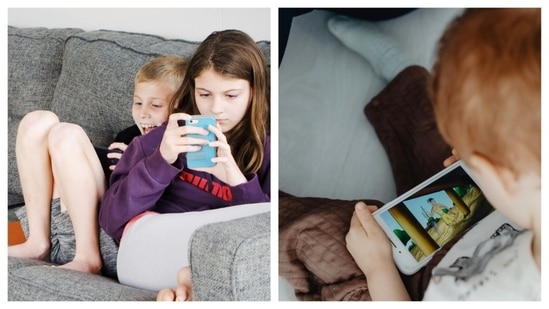
New research shows reducing screen time drastically improves your child's mental wellbeing in just 2 weeks
8 months ago | 68 Views
The pervasive presence of digital devices in human life has debilitating consequences. Every touchpoint of human interaction is marked by technology. With easy access to myriad entertainment formats, digital devices have reshaped leisure time. However, the constant stream of unending entertainment warps time, and before you know it, the day is over. Kids especially, spend hours on digital gadgets. They are energetic and cannot sit still for long, constantly requiring engagement.
In the pre-digital era, they burned this energy off playing outdoor games with friends. Now, with digital devices easily available at home, they no longer need to step outside to shoo away their boredom. Digital gadgets keep them engaged with a wide array of content. Long hours of screen time have adverse effects on children's mental wellbeing. A new study from the University of Southern Denmark found a significant correlation between reduced screen time and improved mental health in kids. Behaviour showed rapid improvement within just two weeks of reducing screen time to an average of three hours per week.
Improvements
On average, children spend almost 7 to 8 hours every day on entertainment, be it playing games, or watching movies. The study concluded that reducing this to 3 hours makes them emotionally more stable. The improvement is rapid, with visible changes within just 14 days. By monitoring screen time, children become more prosocial, thoughtful, and helpful to others. They also start to get along well and bond with their peers. Children are always bubbling with energy, and digital gadgets don’t fully expend this energy; instead, they contain it, making them feel worn out. By reducing screen time, you redirect their energy, promoting positive prosocial behavior and emotional growth.
Balance is the key
The researchers recommend reducing screen time, instead of eliminating it. Recreational activities have evolved, and digital devices will inevitably be a part of leisure time. The key is moderation and setting boundaries. Children need to understand the limits of usage. Excessive screen time, such as 7 to 8 hours, is unhealthy and can stun their development. With a more balanced approach, leisure time can be more fun. Curbing screen time to only 3 hours per week significantly improves children’s behaviour.
In a screen-saturated world, where the way of human life has unprecedented gadget involvement, the only way is to be mindful and monitor your children. If you completely cut off digital gadgets, chances are it may end badly with loud tantrums and as a reverse psychology, lead to even more screentime once when acquired. But if you communicate with your children and ensure sporadic phone usage, it keeps your child’s digital consumption satiated and your worries away.
But change also starts with you, as a parent. Next time your child throws a tantrum or gets in the way of your work, don’t hand over your smartphone to distract them. Find healthier alternatives like mind-stimulating puzzles or books to keep them engaged. Remember, a little effort goes a long way.





















